-
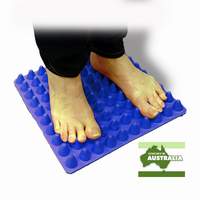
Sensa Mat Blue
-
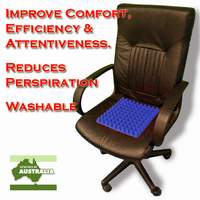
Sensa Mat Blue Office Chair
-
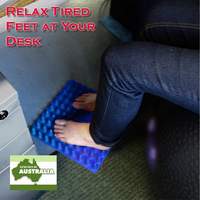
Sensa Mat Blue Office Feet
-
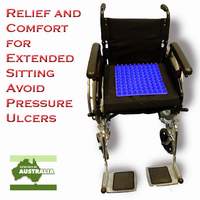
Sensa Mat Blue Wheel Chair
-
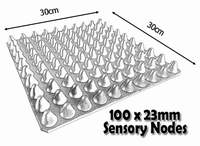
Sensory Mat Edbges B&W Tile Dimensions
*While all efforts are made to check pricing and other errors, inadvertent errors such as outdated or incorrect prices do occur from time to time and AOK Health Pty Ltd and its Associates reserves the right to decline orders arising from such errors.
*Due to changing market forces and other extenuating circumstances that affect product availability and price stability. We reserve the right to withdraw any product we advertise and change prices without notice.
Sensory Feedback Mat
100 Hundred 23mm cones in a 31cm x 31cm mat
EVA Hardness 30+ - Easy to clean
Average foot is stimulated by 21 to 28 AcuPoints
In a recent study conducted by the Oregon Research Institute (ORI), textured surface for the feet exercise has demonstrated an improvement in physical function and reduction in blood pressure to a greater extent than conventional walking in older adults.
Studies report that stress related symptoms and illness contribute to nearly 60-70% of the visits to primary care physicians. Reflexology can be beneficial in stress reduction as well as pain management, by accelerating the bodies own natural healing ability. 30cm x 30cm AcuSense Mat is ideal for use under your desk at home or work.
-
Reduce falls risk in the aging
-
Great for foot massage and reflexology.
-
Excellent for children who have sensory issues.
-
Excellent builder of motor skills for children with multiple terrain issues.
-
Use it on your chair/wheelchair to avoid pressure points
A better choice than a cobblestone mat. You won't loose or break the cobbles! It also gives a gentler foot feel for those with sensitive feet.
-
Aged Care
-
Multiple Schlerosis
-
ADHD
-
Parkinsons
-
Sensory Difficiencies
Information from the mechanoreceptors (sensory organs or cells that respond to mechanical signals such as touch) in the foot sole skin has a large impact on balance and postural control. Four different types of receptors provide information regarding skin contact, indentation pressure, slips and skin stretch to facilitate orientation of the body in the environment and for postural equilibrium. As we age, the fidelity of the information relayed by the sensors in the skin is decreased. With a reduction in skin information, there are deficits in balance control and an increased incidence of falls in the elderly. Current strategies to improve balance involve the augmentation of skin input through stimulation of the mechanoreceptors.
Information from the mechanoreceptors in the foot sole skin has a large impact on balance and postural control. As we age, we experience DECREASED information from foot sole skin input. One solution is to augment skin information with the intent of improving balance.
Mechanoreceptors are structures in the body that enable people to experience physical sensations. They feed tactile information to the brain so the brain can process it, providing information about objects in the environment people interact with, as well as vibrations in the air and other sources of physical sensation. There are a number of types of mechanoreceptors, designed to sense different kinds of tactile information, and these structures function in different ways. In disorders involving sensory sensitivity, people may have problems with their mechanoreceptors or the nerves that carry information from these structures to the brain.
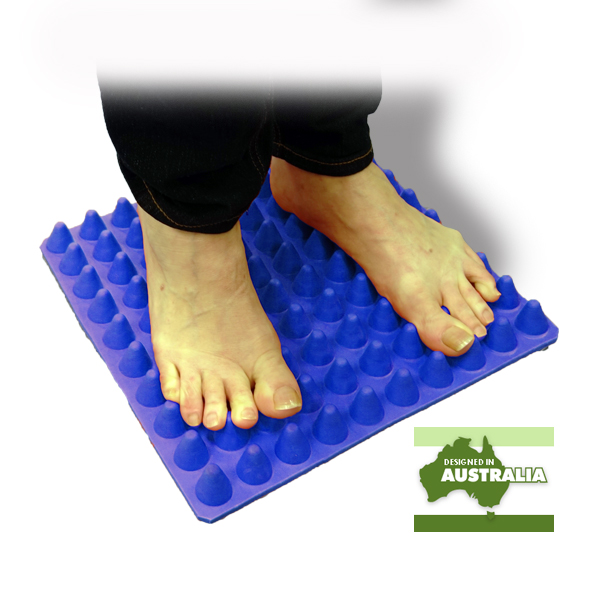
AOK Sensa Balance Mat - Blue
 checkout
checkout
 Payment Details
Payment Details Delivery Details
Delivery Details Returns and Refunds/Exchange
Returns and Refunds/Exchange Order Tracking
Order Tracking Technical Info
Technical Info Privacy Policy
Privacy Policy Legal
Legal




 You are not currently logged in
You are not currently logged in Customer Login
Customer Login Create an Account
Create an Account









 TOO BIG for AusPost, or POBox/Parcel Locker/Private Box
TOO BIG for AusPost, or POBox/Parcel Locker/Private Box
 Videos
Videos Articles
Articles